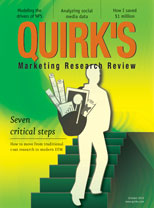Editor’s note: Paul Kirch is CEO of Actus Sales Intelligence, a Fort Worth, Texas, business and sales consulting agency. He can be reached at 214-295-6111 or at pkirch@actussales.com.
Everyone knows what happens when we assume. So a recommendation to be more assumptive in your selling might seem to fly in the face of conventional wisdom but I assure you, it's crucial to improving your consultative sales approach. Hear me out.
Oftentimes, there is an opportunity to upsell during the bidding stage or when the project is awarded by taking an assumptive position. Through assumptive selling, you can create an opportunity to maximize the revenue potential while increasing the value presented to the customer. The end result is a win-win where the buyer receives better service from the seller, thanks to a consultative approach.
Consider when you're dining out at a nice restaurant. At the end of the meal your waiter asks “Would you like anything for dessert?” Unless you already decided you were going to enjoy dessert, this question generally does not create many orders. In fact, many people decline when asked this way since they don’t want to seem overindulgent.
Let’s take that same scenario but with a different approach by the waiter. This time, he doesn’t ask you if you want dessert. Instead, he brings the desert tray and starts walking through each one, describing all of the wonderful things about each. In this example, he has assumed that you’re treating yourself to a nice meal and assumes you’ll also have dessert. This leads to more successful upsells. It also leaves a positive impression on the customers, who are more likely to return and refer others. By making such an assumption, the result is more revenue for the restaurant, happier customers and stronger customer loyalty. Learn to apply this principle to your own business and you can increase revenue while providing better service and support to your clients.
Here are five ways to be more assumptive in your sales approach.
1. Make assumptions!
If you understand your clients’ needs and assume that they’d want an additional service, you can change the way they see you. If that service provides value to them and serves as a benefit, you’re going to stand out.
"You mentioned timing is crucial so I’m including our priority support package with the proposal."
2. Ask questions.
To be assumptive, you must understand their needs. That requires digging in and asking questions. Only when you know what they’re ultimately trying to accomplish can you provide solutions.
"What is the ultimate goal of this project?"
3. Use your knowledge.
Leverage your own knowledge of the products and services you offer to provide solutions. This is a level of service most sales reps don’t provide.
"I’d recommend you include Product/Service X to give deeper insights.
4. Give benefits.
Product and service features are important but the benefits that come from each offering are the real key to sales success. You must uncover needs before knowing what benefits your client really needs.
"We’ll set up your project online, which means you’ll have more time for other things."
5. Give reminders.
Use this time to remind clients of other offerings. Don’t expect customers to remember everything on their own.
"This would be a perfect time to integrate our reporting tool for better visibility."
Need to stand out
If you want your staff to be more assumptive in their approach, give them what they need to stand out from the sea of competition. By providing the right set of tools, you can give your team an edge, which will result in stronger relationships between your clients and the sales staff and lead to increased revenue and deeper customer loyalty. By adding assumptive selling to a consultative sales strategy, we can create the ultimate win-win scenario.
